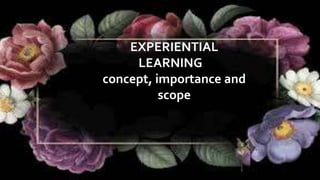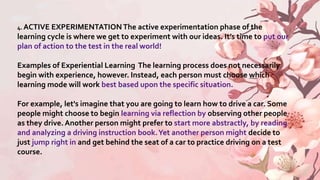Experiential learning is an active learning process that engages learners through direct experience. It combines direct experience with focused reflection that builds on past knowledge and experiences. Experiential learning draws on the works of Dewey, Lewin, and Piaget and is defined as a process where knowledge is created through transforming experiences. Kolb's experiential learning theory presents a four stage cycle of concrete experience, reflective observation, abstract conceptualization, and active experimentation. Experiential learning has broad applications in areas like education, corporate training, and personal development.


























